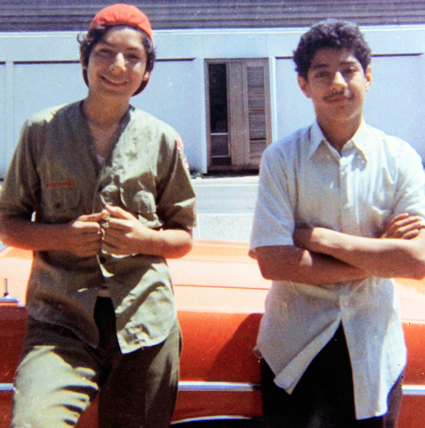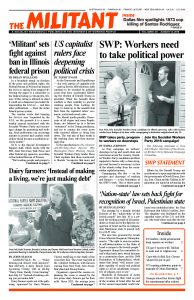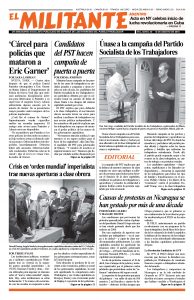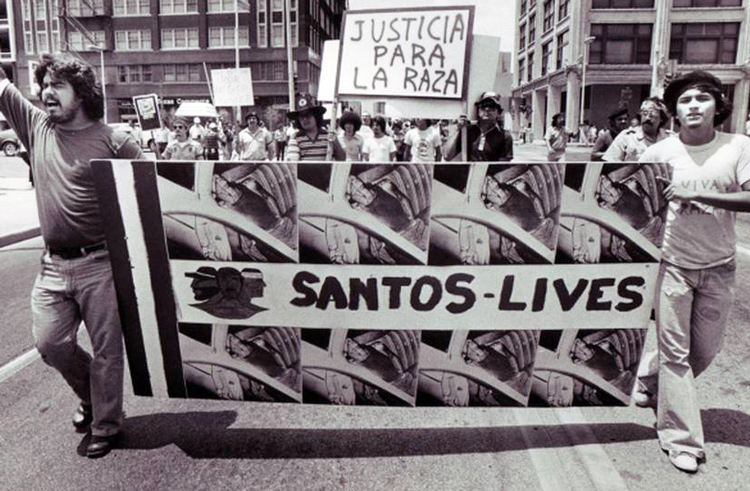DALLAS — Over 500 people attended a widely publicized July 24 screening of the new film “Santos Vive,” which documents the murder of 12-year-old Santos Rodriguez at the hands of city police here on that day in 1973. The film, shown as part of the USA Film Festival, was introduced by director Byron Hunter.
Other events took place to commemorate his life, including a community gathering and fundraiser at Pike Park — where efforts are underway to dedicate a community center to Rodriguez — and a service at his gravesite. The cop murder of Rodriguez ignited a broad movement for justice, part of the rise of the Chicano movement in the U.S.

In the early morning of July 24, 1973, Dallas cop Darrell Cain came and took Santos and his brother David from their home. Cain told them he knew they were guilty of breaking in and stealing $8 in coin from a soda machine in a local gas station. When the youth insisted they were innocent, the cop handcuffed them in the back of his patrol car and pulled out his .357 Magnum pistol, putting it Russian roulette-style to the side of Santos’ head. He pulled the trigger, and the youth continued to insist he wasn’t guilty. Cain pulled the trigger again, and the shot killed Santos. His death provoked widespread protests. Cain was convicted of “murder with malice,” but served only half of a five-year sentence.
DNA tests after his murder confirmed Santos was innocent.
Hunter was asked to make the documentary by the Southern Methodist University’s human rights program and the Dallas Peace and Justice Center. He grew up in the city and was 9 years old when Rodriguez was killed.
“My remembrance of Santos Rodriguez is vivid,” the award-winning filmmaker told the Dallas Morning News. “My dad came to me to say, ‘Something bad happened, son.’”
Areeba Amer, a 17-year-old Pakistani-American who just graduated from Greenhill High School, is interviewed in the video. Her literature of human rights English class had been assigned to study Rodriguez’s murder — something she had never heard about before. She was moved to write an op-ed for the Morning News calling for a memorial to be built to commemorate Rodriguez.
“Many Americans are working to ensure that those who lost their lives in recent incidents of police brutality are not forgotten, such as Michael Brown, Walter Scott and Alton Sterling,” she wrote.
A fundraiser was held at the Pike Park recreation center, built in 1915 in an area that serves as an important landmark for the Latino community, known as “Little Mexico.” Santos’ mother, Bessie Rodriguez, joined those at the event. The film describes how the neighborhood grew and now has declined. The place where Rodriguez was killed is now an office complex.
The barrio was established when Mexican workers settled permanently in Dallas to work on the area’s expanding railroad system. A letter to President Jimmy Carter from Bessie Rodriguez was read at the gathering. Carter came to Dallas in 1978 in response to protests around Santos’ killing. “You led us to believe you would prosecute the cops,” she said in the letter. “I do not think I will believe you again.”
The goals of the fund drive are to support an often-promised memorial to Santos at the center; to support his family, which has never received any substantial compensation; and to help ensure “Santos Vive” is completed and gets wide circulation.
Dallas Park Board member Jesse Moreno is one of those working to memorialize Santos Rodriguez at the community center in Pike Park. He says he’s under pressure to back off.
“The feedback I’m getting is, ‘Let’s soften it up, tone it down and not use words like murder,’ which is what happened,” Moreno told the Dallas Observer July 16.


